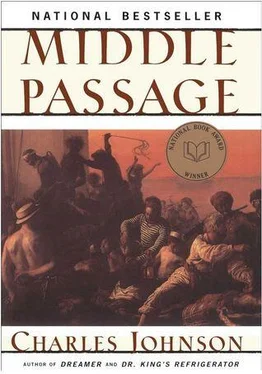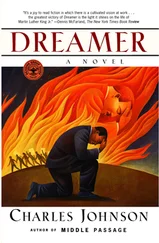“I think I’ll get the hang of it. But, Cap’n, why do I need all this?”
He began to undress slowly, the moonlight and candles doubling his shadow against the wall. Falcon’s buttonless blouse gave him trouble when he tried pulling it over his enormous head; its collar caught under his beard, leaving him hooded for a moment (I believe I could have shot him then, and I even pointed the pistol at his head to see how this might feel) with both his arms helplessly in the air. “Give me a hand here, Mr. Calhoun. I hope you can see that I trust you. I need a colored mate to be my eyes and ears once the Africans are on board. Same with the crew. I want to know what each man’s thinkin’.” Against my better instincts to gun him down right there, I helped the skipper pull his shirt free. Now he was dressed for bed in his nightshirt and steel-toed boots. “Once weekly I’ll want a full report. If there’s any talk, you’ll tell me.”
“Be your Judas?” I asked. “A spy?”
His eyes filled with hurt, slipped to a corner of the room, as if the correct word he wanted was there. “Nay, a friend! I need someone to keep his eyes open and tell me of any signs of trouble.” He lay back on his bed, drinking straight from the jug now, and began bellyaching more to himself than to me about his officers, bitterly relating personal things about each I never dreamed of and did not wish to know. He was clearly breaking confidences, betraying every one of them in a voice so venomous I wanted to cover my ears. I felt uncomfortable. More: I felt unclean as he described in detail all the dirt and gossip, weakness and shortcomings, of every mother’s son on board. Everyone, it seemed, had a secret. A shadow. A buried past so scandalous that I was nervous for the rest of the night. Why was he saying these things? I could only speculate that something was seriously wrong with the ship — he never specified what — and his solution was the oldest and simplest in the world. Divide and conquer. Poison each man’s perception of the other. By making me hear of each man’s faults (I had no choice) he subtly compromised me, made me something of a betrayer too, and I sighed and shut my eyes, thinking of Isadora, who would say these things were sent to try us. Moments later he was asleep. I leaned over him, wanting to empty into his head the pistol he’d given me, but found myself transfixed by the crude ring twinned on his left hand and mine, as if, heaven help me, we were married, and the very thing I’d escaped in New Orleans had, here off the unlighted coast of Senegambia, overtaken me.
Sleep and I were strangers that night. All that evening, moaning and sharp cries such as only Negro women can make drifted on the wind from the warehouse, where Africans living, dying, and dead were thrown together. Hoping to steady my thoughts, twisted worse than rigging after a storm, I shook awake Squibb, there on deck, and asked him about our cargo. Sailors, I know, can be careless with the truth, but he told me the first caravan of Allmuseri were being separated for the morrow’s sale: husbands from their wives, children from their parents, the infirm from the healthy, each parting like an amputation or flaying of skin, for as a clan-state they were as close-knit as cells in the body. “First, Ahman-de-Bellah will have his people shave off their body hair. That’s the first humiliation, makin’ ’em smooth as babies from the womb, like mebbe they was born yestiday. He’ll have them bathed, soaked in palm oil to make their black hides glisten like leather, then they’ll get a feast to fatten ’em for tomorrow’s buyers.”
In the darkness I said to the shadowy lump he was on deck, “Like cattle?”
“Like Allmuseri,” he replied. “They’ll get what Africans are used to eatin’. Roots like, cooked green or else dried and made into flour, then mashed or stewed into porridge. They’ll get a tasty sauce with it too, and probably some honey beer made from maize to wash it down.” He lifted his hips a little, then broke wind gently, a faint ripple of sound as if he’d tightened his sphincters to soften the sound of it. “We should eat so well, darlin’.”
“Squibb!” shouted Cringle. “If you do that again, you pig, I’ll make you sleep below, or on the other side of the ship!”
“Pardon me, sir, but that’s Nature, yuh know. A man shouldn’t keep it inside, and that. ’Tain’t healthy, me wife Maud used to say. It’s bad for the heart, she says. Why, when we first got married Maud usta say—”
“I don’t care what she said! I’m not your bloody wife, man!”
“Aye”—he winked my way—“thank God fer that.”
Quietly, under his breath, Cringle repeated one of his Scriptural passages, then rolled over and slept, as did Squibb, flat on his back with his parrot on his belly, like a sea gull atop a whale in a tropical current.
Next day I joined them in the landing party that went ashore. The Republic lay at anchor a distance of ten cables from the fort, with McIntosh at the helm, and slip ropes on her cables, the ship ready to spread canvas and sail if for some reason Bogha betrayed us. By the time the last Allmuseri caravan arrived it was full dark. A balmy night. Squibb and I bloated ourselves on beer in the town square, tossed coins to beggars crippled at birth by their parents to make them better panhandlers, and watched one turbaned harem girl whose figure and veiled face filled me with such longing that I felt as if my life’s blood splashed to the ground each time she sashayed by, so fascinating was this girl, and so long had I felt coltish and unwillingly celibate at sea. I knew my hungry gaze must have burned her, for her brown fingers, long and thin with bones frail as a bird’s, gently brushed my hand the fourth and fifth times she refilled my mug. By that time my heart was bouncing off my ribs, and I barely saw two African boys sprint past us, announcing the approach of a caravan from the interior. I stood, felt unsteady, then sat again, hearing gunshots from afar. Behind us the fort’s many guns replied, so thunderously the air shook. Abruptly, all was confusion. Cries went out from every merchant. From every bazaar the coffle’s arrival was cheered. I looked around for the lass, but she was gone. I stood to see better. Squibb yanked me back to my seat.
“Better yuh keep your noodle down, Illinois.” He was instantly sober, his grip on me tight as a winch. “Or yuh’ll be sold too. Stolen right off ship, I’m sayin’, and pressed into a gang. It’s happened before.” He tugged a little at my sleeve. “These blokes don’t know you’re a sailor. And they don’t care.”
He needn’t have told me twice. I squeezed back a little into the shadows, watching Bogha’s servants light palm-oil lamps atop the fort’s walls. Cautiously I eased back into the crowd to see better, sweat streaming inside my blouse, puddling at the back of my spine above my belt. I sighted Cringle off to one side and, sidling up behind him, caught him talking to himself, tapping his chin with his pipestem and appraising the Allmuseri tribesmen shackled in twos at their ankles. As I’d heard, they were a remarkably old people. About them was the smell of old temples. Cities lost when Europe was embryonic. Looking at them, at their dark skin soft as black leather against knee-length gowns similar to Greek chitons, you felt they had run the full gamut of civilized choices, or played through every political and social possibility and now had nowhere to go. A tall people, larger even than Watusi; their palms were blank, bearing no lines. No fingerprints. But all Allmuseri, I had been told, had a second brain, a small one at the base of their spines. A people so incapable of abstraction no two instances of “hot” or “cold” were the same for them, this hot porridge today being so specific, unique, and bound to the present that it had only a nominal resemblance to the hot porridge of yesterday. Physically, they seemed a synthesis of several tribes, as if longevity in this land had made them a biological repository of Egyptian and sub-Saharan eccentricities or — in the Hegelian equation — a clan distilled from the essence of everything that came earlier. Put another way, they might have been the Ur-tribe of humanity itself. I’d never seen anyone like them. Or felt such antiquity in the presence of others; a clan of Sphaeriker. Indeed, what I felt was the presence of countless others in them, a crowd spun from everything this vast continent had created.
Читать дальше












